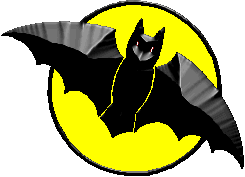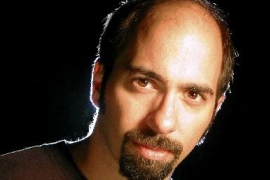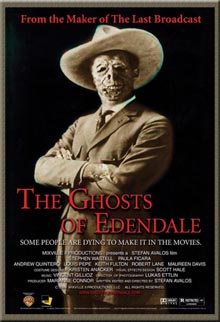|
|
|
| Owen: You started as a child musician -
a violin prodigy - how (if at all) did the
discipline and flow of an instrument help you as
a director of films?
Stefan: I think the discipline taught me to stay focused on whatever job was in front of me. Dogged determination, some would call it. I think musically a lot of the time when making movies, and I also take a very active role in the musical scores of the movies. Telling a story, how to set something up and then (hopefully) deliver it, is very much like music. It's largely about rhythm. Owen: You do so many aspects on your films write, director, produce, edit, act, sound ---- which is the least and the most difficult for you to do? Stefan: I think that all of the aspects are difficult. Writing is the most difficult, no question. It's the point in time when there's nothing there. No one is there either. It's a brutal time. I wouldn't call it the easiest, but for me the most joyful part of the process is the editing and sound design. On set, working with actors, etc. - that's a good time too, but it is so early in the process that it can be a very frustrating and nerve wracking time. Maybe that changes when the budgets are larger. Owen: So back on 1998 - THE LAST BROADCAST was the World's first theatrical digital release of a feature film via satellite. What exactly were the details involved in that as well as the overall repercussions? Stefan: Geez, there were a lot of financial details and business details which get kinda dull. They're actually the most important, and even to this day are the main things slowing down digital cinema. Technically, we retrofitted the theaters with digital projectors from a company called Digital Projection Inc. They make projectors capable of resolution and brightness that is unreal. Very high-end stuff. Also, the theaters were fitted with a computer server and satellite dish. Then, from Mountain View Ca, a subsidiary company of Loral Space called Cyberstar beamed the movie to a satellite, where it was then picked up by the various theaters. The movie was then downloaded to the theaters where it was saved onto hard drives in the servers. Then it was played back from there. It would be pretty easy to do it nowadays, and you could do it with any broadband Internet connection. In 1998. it was a different story. It was a proof of concept and each company had things they wanted to address. Security issues, picture quality issues, etc. Obviously for us, entertainment issues were our biggest interest. In terms of the repercussions: people were intrigued. All the studios called, as well as a lot of indie filmmakers. People were curious as to how this could fit their agenda. There were also several parties that were annoyed that two guys from some rural place in Pennsylvania had beat them to the punch. Lucasfilm wasn't too thrilled and worded a lot of their "Phantom Menace digital release" press material in such a way that people would think it was first. Miramax and Disney did the same several years later with their "digital firsts". Fortunately for us, digital cinema geeks everywhere have reminded them otherwise. I think the positive thing that happened was that people with power got off their butts. They realized that if they didn't do it, someone else would (and was) going to do it. It got the digital cinema machine rolling. Still, it's been a slow process. Unfortunately, show business is full of sheep. It's rare for someone to want to actually lead, though everyone wants to appear to be a leader. Exhibitors of course have a huge investment and the distributors know that they're going to have to foot the bill - which is why they are, understandably, dragging their feet. However, people like "indie-producers reps" are just cowards. These guys are generally idiots who have printed up some business cards and have very little imagination - though they believe otherwise. Now quite a few of them have jumped into digital cinema - espousing it as the next coming, even though they were nowhere to be seen when it was not so obvious. Owen: WIRED magazine named you as one of their 25 people helping to reinvent entertainment --- do you have any ideas as to how you plan to carry out that mission further? Stefan: For a while I was pushing the development of entertainment for small handheld stuff. I got interested in that when I got an Ipaq type device in 2000. Now though, there's plenty of ways to do it, whether it's a cell phone, small clamshell player or the new video ipod. I think this interest in small screen movies is the best thing to happen for the short form movie - but I don't think it's going to be the way of the long form. It'll be a pretty limited audience. Video casting will not work the same way that pod-casting, etc. works. It requires too many senses. It's too encompassing. In other words: you can't go jogging and watch a video. I am most interested by how the interface of downloading movies to people can work successfully. I'm trying to figure out how to basically give away movies and still make money. I know there's gotta be a way somehow. I also think that audience involvement 'through' the moviemaking process has an interesting future. I think it could possible for audiences to be involved in a movie from the conception to the actual exhibition. Imagine an interactive fan magazine... where fan input could actually result in a change in the movie as it is being developed. It could actually make for much better movies. You know, why test screen movies when they're finished? It's too late then. Do it from day one. Of course there are a lot of details I'm leaving out, or haven't figured out yet. Owen: I am also a huge fan of your movie 'The Ghosts of Edendale'. How did that idea come about? Stefan: Thanks for the compliment. Again it seems I've made a movie that has a polar audience. Some people really like it, and some people really hate it. "Ghosts of Edendale" is a movie that came out of living the fears and excitement of moving to "the city of dreams". I thought it was kind of interesting to see how Hollywood can make a god out of someone or, more often, completely destroy them. I thought that had the potential for psychological horror. I also was really intrigued by the early days of Hollywood. Being able to see the people that lived in the place you live, going through their actions over and over again is a pretty "ghost like" thing. I riffed on that idea. There is a horrible, powerless terror in this town, as people you know "make it", and others don't. You wonder why? I mean, sometimes it's obvious, but there is also a certain intangible force at work. Most would call it luck - good or bad. Whatever you call it, it causes a lot of night sweats for a lot of people. I wanted to also touch on that. Owen: That movie has some amazing special effects in it as well, which was the most difficult to achieve for the camera? Stefan: The most difficult thing to do was nail the motion tracking. Since nothing was done with a motion control rig (where the camera moves are memorized by the camera mount), we had to do it by eye. When two elements are supposed to be the same shot, they have to move exactly the same way. It's the kind of thing that if you miss by even the slightest amount, the effect goes to hell. Also, the ghost party at the end of the movie, while not difficult to do, was very tedious. Owen: I notice too that many of your films combine fiction and non-fiction --- would you call that a coincidence or a very conscious choice in what makes horror grounded? Stefan: They always say to write about what you know - I guess I take it to an extreme. Seriously, for horror to work, it has to be something people can relate to. Being chased, fear of things you can't see - are all things we all know about. It might be why "Ghosts of Edendale" has a specific audience. It's not a horror that everyone, especially kids, might relate to. People who haven't gone through that feeling of being "thrown away", a breakup or getting fired from a job you really liked for example - might not relate to the horror beyond the simple ghost story part. Owen: So what's next on the slate for you - I have heard you are doing a non-genre film entitled 'Diamond Road'. Stefan: Yeah, I'm excited to be doing an action adventure movie. I'm really hoping for it to be like the old school adventures. I think Michael Bay has been really bad for the genre, and I'm hoping this works for people who dig "Raiders of the Lost Ark" more than "The Island". It has a lot of elements that I really like - old airplanes, old guitars, hot women, a search for treasure, etc. Then it's back to horror business as usual with 'Children of the Lake' --- if you need any victims or anything let me know - I'm a little beyond the kid stage. Always looking for a good victim. I’m always accused of being one. Seriously, I don't know what is next after Diamond Road. I think I'd like to direct some outside work, something written by someone else. Could be any genre (except for period drama) Owen: What scares you in real life? Stefan: Bills. They never stop coming. I also think a random home invasion is a really scary notion. There's also a crawl space under my new house with a strange, closed off room with a staircase that leads nowhere. That's kinda freaky. |









